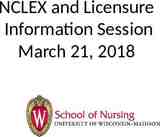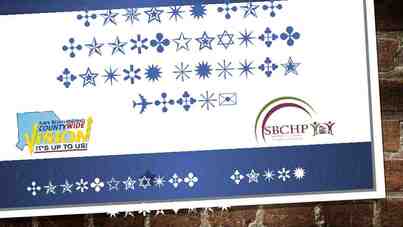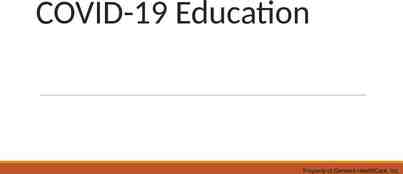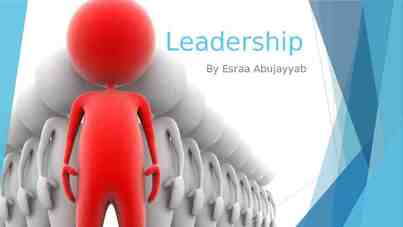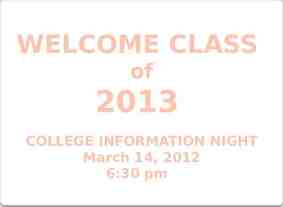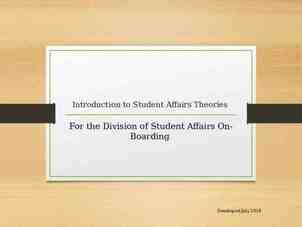School Psychology Bailey Sanderson
16 Slides2.77 MB

School Psychology Bailey Sanderson

Who am I? My name is Bailey Sanderson and I am a second year graduate student in the School Psychology program here at UCF. My goal with this presentation is to share about and raise awareness for the field of school psychology since we are currently experiencing a critical shortage.

If any of these sound appealing, you might want to consider school psychology Helping to create effective schools 1 Assisting families and Teachers 2 3 4 5 Working with children Helping students reach their learning potential Promoting positive behavior and mental health

Who are School Psychologists ? They are highly qualified professionals with an advanced graduate degree. School Psychologists are experts in learning, behavior, mental health, and school systems. They work hard to promote children’s learning, development, and social-emotional skills.

What do School Psychologists do? Improve academic achievement Create safe, positive school climates Promote positive behavior & mental health Support diverse learners Strengthen family-school relationships Improve school-wide assessment

What else can school psychologists Conduct psychological, academic, and behavioral assessments such as IQ tests, academic evaluations, behavior rating scales, etc do? Identify and classify students for exceptional education services Short term and crisis counseling as well as individual/group counseling Crisis response and crisis assessment Consult with teachers and other school staff Plan interventions to improve student learning and behavior Work with administrators to improve school wide policy Promote culturally responsive services and practices Support struggling and diverse learner Behavioral observations, behavioral analysis, and implement behavior plans Support social emotional learning Implement and promote positive discipline and restorative practices Help families understand their children’s learning and mental health needs Monitor student progress in academics and behavior

Where do School psychologists work? Private Practice Schools Preschools, K-12 public schools, private schools, charter schools, and universities. Clinical Settings Hospitals, clinics, mental health centers, community treatment centers Other School administration, juvenile justice programs, and state

How to become a school psychologist

The three steps Attend college/prepare for graduate school Complete graduate school requirements Become licensed

1 Preparing for graduate school

Preparing for graduate school The most common majors include: Psychology Education Child development Volunteer or work with children Mentoring programs Summer camps tutoring Research NASP approved programs you would want to attend Take the GRE Decide if you would like to pursue a specialist or doctoral degree Apply and Interview!

Difference between EdS and PhD? Specialists Degree (EdS) Requires 60 hours of graduate coursework 3 years full time including internship Entry level degree Typically allows for work in schools and private practice in some states Doctoral Degree (PhD, PsyD) Requires 90 hours of graduate coursework Around 6 years of coursework Allows for positions in academia, research, and universities More options for clinical and private practice No states require a doctoral degree for

Licensure in Florida and Nationally Florida: Certification as a school psychologist Allows you to work in the schools Complete your year long 1,200 hour internship and all graduate coursework Submit licensure application Pass the state licensing exams Licensure as a school psychologist Allows you to work in unsupervised private practice Must have all of the requirements of certification plus three years of experience in the field not counting internships You must be supervised by a licensed school psychologist in order for the experience to count Must pass a national licensing exam (Praxis-II) Nationally Certified Complete a NASP approved program and be certified in your state Pass the Praxis II exam

Thank you! I would also be more than happy to answer any questions you have about the field of school psychology or graduate school in general. If you have any questions you can reach out to me via email at [email protected]

3 Dyslexia You can enter a subtitle here if you need it

References Castillo, J.M., Curtis, M. J., Chappel, A., & Cunningham, J. (2011, February). School psychology 2010: Results of the national membership study. Paper presented at the annual convention of the National Association of School Psychologists, San Francisco, CA. Fagan, T. K., & Wise, P. S. (2007). School psychology: Past, present, and future 3 rd Ed. Bethesda: NASP. Harrison, P., & Thomas, A. (2014). Best practices in school psychology VI. Bethesda: NASP. NASP, (2022). NASP Exposure Project Improving the Lives and Learning of Children. [powerpoint slides. U.S. Census Bureau (2010). Place of Birth of the Foreign-Born Population: 2009. Washington, DC: U.S. Census Bureau. www.census.gov/prod/2010pubs/acsbr09-15.pdf U.S. Census Bureau (2010). Race and Hispanic Origin of the Foreign-Born Population in the United States: 2007. Washington, DC: U.S. Census Bureau. www.census.gov/prod/2010pubs/acs-11.pdf U.S. News & World Report. Best Social Service Jobs. Retrieved from http://money.usnews.com/careers/best-jobs/school-psychologist

